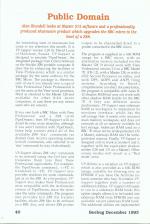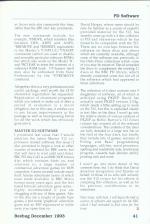Alan Blundell looks at Master 512 software and a professionally-produced shareware product which upgrades the BBC micro to the level of a Z88.
Public Domain
An interesting item of shareware has come to my attention this month. It is VP-Support version 2.20 by David Lucas of Hailsham, Sussex. VP-Support is designed to emulate PipeDream, the integrated package from Colton Software on the Sinclair Z88 portable computer. It does this by enhancing the facilities of View Professional, which is a similar package (by the same authors) for the BBC Micro. The package is, therefore, only of use if you already own a copy of View Professional (View Professional is not the same as the View word processor, fitted as standard to the Master 128 and available for other 8-bit Acorn computers, in case there are any newer users who are unsure).
If you own both a BBC Micro with View Professional and a 288 (with PipeDream), then VP-Support will no doubt be even more attractive, although if you aren't familiar with PipeDream, three help screens detail all of the available Z88 'star' commands (as distinct from Acorn's operating system in-built commands, also referred to as 'star' commands by way of shorthand).
VP-Support allows Z88 'star' commands to be entered using the Ctrl key and translates them into their View Professional equivalents. For example, the PipeDream command, <>PU is translated to \H1. VP-Support also provides windows for some commands, just as on the Z88. As a by-product, VP-Support also makes View Professional more compatible with the Archimedes version of PipeDream, since the latter uses the same commands. The program also provides full Z88 file transfer facilities, allows Z88 files to be archived on a BBC disc, and allows Z88 printer output to be channelled direct to a printer connected to the BBC micro.
The program is supplied as a 16K ROM image for a BBC micro, with an alternative version included for the Master 128. It should work with View Professional version 2.0 on a BBC Model B, (OS 1.2), with a Master 128, or with a 6502 Second Processor on either, and with DFS, ADFS and ANFS filing systems. According to David's comprehensive (on-disc) documentation, the program is compatible with Aries B-32 shadow RAM but may not work with other shadow RAM boards for the BBC B if they use different access mechanisms. VP-Support uses sideways RAM as workspace to implement its windows interface, which has the advantage that it needs only minimal main memory workspace, and does not encroach at all on memory available for text storage. Sideways RAM used on a BBC B must not be write-protected. On a Master, sideways RAM can't be write-protected anyway. Finally, VP-Support is designed only to work in modes 0 and 3, together with the equivalent shadow modes (128 and 131 on a Master). Other screen modes will result in a "Bad mode" error.
VP-Utilities is a variation on VP-Support which is also provided as a 16K ROM image, suitable for blowing into an EPROM if you have the facilities (or know someone who has). It contains VP-Support together with a number of additional utilities. VP-Support still needs to run in a sideways RAM bank; this option simply allows it to be loaded into sideways RAM from EPROM into any available vacant sideways RAM bank.
The additional utilities are implemented as Acorn style star commands this time, rather than the Z88 'star' key commands.
The new commands include, for example, *FMOVE, which transfers files between DFS, ADFS and ANFS, *RREMOVE and *RINSERT, equivalents to the Master's *UNPLUG /*INSERT commands (which are used to disable and re-enable particular sideways ROMs) but which also work on the Model B, and *RCLEAR to erase the contents of a sideways RAM bank. VP-Support itself may also be unhooked from View Professional by the *VPREMOVE command.
Altogether, this is a very professional and useful package, well worth the £5.00 shareware registration fee requested. Registration of shareware programs which you intend to make use of after a period of evaluation is a moral obligation, but in this case, it entitles you to any future improvements in the package as well as recompensing David for all the work which has obviously gone into it.
Master 512 Software
I promised last issue that I would mention the latest Master 512 co-processor related software this issue (I also promised to begin a look at other sources of material for BBC users, but that will have to wait until next time).
BBC PD disc GA3 is an 800K DOS format disc which contains hints on, and solutions to, a large number of commercial adventure games for DOS computers. Games covered include many Scott Adams adventures (some of which were made available in BBC Micro format many years ago), and the text based Infocom adventure game series - highly recommended if you are struggling with any of these games. Also on the disc are a couple of arcade type games, a text mode 'graphical' adventure game and an ESP experiment to while away your spare time on.
David Harper, whose name should by now be familiar as a source of expertly provided material for the 512, has recently come up with a 4 disc collection of PD and shareware which he has found to be compatible with the 512.
There are no overlaps between the software on these discs and others which are currently available, although some of the software was previously in the Dabs Press collections which some of you may be aware of. David compiled the discs to complement the existing 21 discs in the BBC PD library, which already contained some but not all of the software which had appeared in those collections.
The collection of four discs contains over 5 megabytes of software, all of which is archived using PKZIP. David has actually used PKZIP version 2.04g, which needs a little setting up to work on the 512, but this is explained clearly in text files on the discs. I won't go into the relative merits of various versions of PKZIP as Robin Burton's 512 Forum column has covered all of the relevant considerations. The contents of the discs are fully detailed in a large text file on the first of the four discs, but briefly they include lots of games, versions of Prolog and Basic programming languages, utilities, word processor, spelling and readability aids, world map program, cassette tape labeller utility, printing aids and more.
I won't go into more detail of the contents here, but I do think that David deserves recognition and thanks on behalf of those of us who still actively use the 512 co-pro for his efforts in compiling this collection, as well as for his previous contributions to its usefulness.
Next issue, with luck, I will begin the look at sources of software and support for the BBC which I had intended to find room for this issue.
This article was converted to a web page from the following pages of Beebug Volume 12 Number 7.


 1st December 1993
1st December 1993

